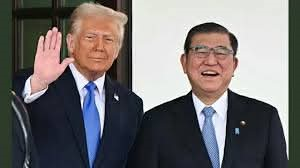KPL
(KPL/Yonhap) The White House said Wednesday that Japan has agreed to purchase 100 Boeing aircraft and billions' worth of agricultural and other products, and increase imports of U.S. rice by 75 percent as part of a trade deal struck this week.

(KPL/Yonhap) The White House said Wednesday that Japan has agreed to purchase 100 Boeing aircraft and billions' worth of agricultural and other products, and increase imports of U.S. rice by 75 percent as part of a trade deal struck this week.
It released a fact sheet detailing the "U.S.-Japan Strategic Trade and Investment Agreement" that included an agreement by Japan to purchase US$8 billion in U.S. goods, including corn, soybeans, fertilizer, bioethanol and sustainable aviation fuel.
On Tuesday, U.S. President Donald Trump announced the deal, saying that his administration will impose 15 percent "reciprocal" tariffs on Japanese products, 10 percentage points lower than what was previously announced.
Under the deal, Japan will invest $550 billion to rebuild and expand core American industries, the White House said, stressing that it is the single largest foreign investment commitment ever secured by any country and will generate hundreds of thousands of U.S. jobs and expand domestic manufacturing.
At Trump's direction, the funds will be used to revitalize America's strategic industrial base, including energy infrastructure and production; semiconductor manufacturing and research; critical minerals mining, processing and refining; pharmaceutical and medical production; and commercial and defense shipbuilding, it said.
The U.S. will retain 90 percent of the profits from the investment, the White House claimed.
It also said that the deal with Japan delivers "breakthrough" market openings across key sectors.
The deal will see a major expansion of U.S. energy exports to Japan and a bilateral exploration of a new offtake agreement for Alaskan liquefied natural gas, while Japan's longstanding restrictions on U.S. cars and trucks will be lifted, according to the fact sheet.
The agreement has fueled a sense of urgency for South Korea as it seeks to secure exemptions or relief from the reciprocal tariffs as well as sector-specific duties on steel, aluminum and automobiles, which are bound to impact Korea's export-reliant economy.
KPL